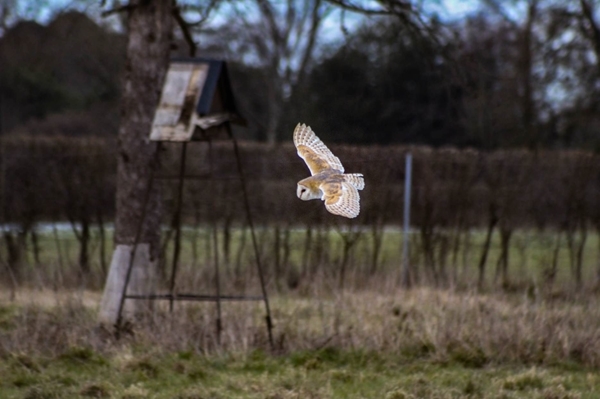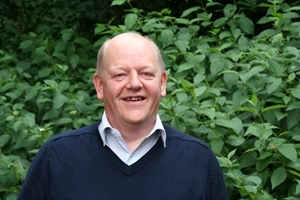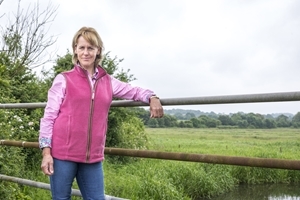
Photo by GWCT placement student Samantha Skinner
JIM Egan has sent out a rallying cry for people to pick up their binoculars and go bird-spotting for the Big Farmland Bird Count (BFBC) which returns on Friday.
The passionate organiser of the count, organised by the Game & Wildlife Conservation Trust (GWCT), is urging farmers, land managers, gamekeepers and all wildlife enthusiasts to spend 30 minutes recording what species they see on their patch of land from February 8th to the 17th.
Your support will help identify the farmland birds that are flourishing due to good conservation methods and ones in need of most support.
 “It would be fantastic to see even more farmers to take part in the count this year,” said Jim, pictured right.
“It would be fantastic to see even more farmers to take part in the count this year,” said Jim, pictured right.
“Counting birds on farm is a great way to recognise what species are there as well as being an opportunity to take time out and see the benefits of work such as wild seed mix and supplementary feeding.
“Taking part and submitting results enables us at GWCT to shout about the important conservation work many farmers are doing.
“We want landowners to be proud of their efforts. We will make sure that the public and policymakers hear about what can be achieved on Britain’s farms. The BFBC is a very positive way to showcase what can be achieved.”
Backing this vital citizen-science project, running for the sixth successive year, is the NFU, who are this year’s sponsor.
 President Minette Batters, pictured right, is vowing her support to the count by going bird-watching on her farm in Downton, Wiltshire.
President Minette Batters, pictured right, is vowing her support to the count by going bird-watching on her farm in Downton, Wiltshire.
She will be joined on day one with GWCT biodiversity advisor Pete Thompson, an advocate of the count, both of whom will be ready with their binoculars, notepads and sharpened pencils, recording what they see.
“I am delighted to be taking part in this year’s GWCT Big Farmland Bird Count which the NFU is pleased to be sponsoring for the very first time,” she said.
“It’s becoming an important national event where thousands of farmers and growers around the country are able to take stock of and importantly, take pride in what they find on their land.
“The NFU supports initiatives like the Big Farmland Bird Count as without sound management of the environment, enhancement of habitats, protection of wildlife and support for pollinators and soils, we do not have farming businesses.
“So, I would encourage all farmers to take part, and also remember to submit your records to the GWCT, so we can pull together a vital national snapshot of the state of nation when it comes to farmland birds.”
A record-breaking 1,000 people took part in last year’s count, recording 121 species across 950,000 acres.
A total of 25 red-listed species were recorded, with five appearing in the 25 most commonly seen species list. These include fieldfares, starlings, house sparrows, song thrushes and yellowhammers. The most plentiful of these were fieldfares and starlings, which were seen on nearly 40% of the farms taking part.
At the end of the count, the results will be analysed by the Trust. All participants will receive a report on the national results once they have been collated.
The count is also kindly being supported by FWAG, LEAF, Kings, Perdix, CLA and NFU Scotland.
How to take part in three simple steps
1) Download your count sheet at our newly-launched BFBC website www.bfbc.org.uk
2) Count your birds! On a day between 8th and 17th February, spend about 30 minutes recording the species and number of birds seen on one particular area of the farm.
3) Once you've completed your count, simply submit your results at www.bfbc.org.uk
Notes to editors
The Game & Wildlife Conservation Trust – providing research-led conservation for a thriving countryside. The GWCT is an independent wildlife conservation charity which has carried out scientific research into Britain’s game and wildlife since the 1930s. We advise farmers and landowners on improving wildlife habitats. We employ 22 post-doctoral scientists and 50 other research staff with expertise in areas such as birds, insects, mammals, farming, fish and statistics. We undertake our own research as well as projects funded by contract and grant-aid from Government and private bodies. The Trust is also responsible for a number of Government Biodiversity Action Plan species and is lead partner for grey partridge and joint lead partner for brown hare and black grouse.
For information, contact:
Eleanor Williams
Telephone: 07592 025476
Email: press@gwct.org.uk